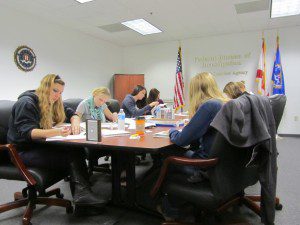The profession of psychology has experienced growing involvement in both civil and criminal justice systems. Psychologists have assumed diverse roles, encompassing activities such as providing assessment and treatment services, conducting research, and serving as expert witnesses in legal proceedings. Their presence extends across various segments of the criminal justice system, including law enforcement, courts, probation, correctional facilities, and parole. Psychologists collaborate with a wide range of individuals within this system, including offenders, victims, and criminal justice personnel.
In the civil domain, psychologists are engaged in areas like civil commitment, assessments of civil competencies (e.g., determining competency to provide informed consent for treatment or research, and establishing guardianship), and addressing other civil matters such as custody and access disputes and personal injury cases. Drawing upon their expertise in assessment, psychologists have made significant contributions to the development of assessment methods tailored to address legal questions. Examples include evaluating the insanity defense, determining competency to stand trial, assessing civil competency, evaluating the risk an individual poses to themselves or others, and making determinations related to child custody. These efforts have led to the refinement and enhancement of assessment techniques for a wide array of legal and forensic issues. Additionally, psychologists may develop treatment models tailored to the specific needs of forensic populations.
Defining Forensic Psychology

Defining forensic psychology can be a complex endeavor, as the term has been used broadly to encompass various aspects of psychology related to legal matters. The Specialty Guidelines for Forensic Psychologists, as outlined by the Committee on Ethical Guidelines for Forensic Psychologists in 1991, provides a specific definition. According to these guidelines, forensic psychology pertains to “all forms of professional psychological conduct when acting, with definable foreknowledge, as a psychological expert on explicitly psycholegal issues, in direct assistance to courts, parties to legal proceedings, correctional and forensic mental health facilities, and administrative, judicial, and legislative agencies acting in an adjudicative capacity” (p. 657).
This comprehensive definition encompasses a wide range of activities within the field, including the involvement of psychologists in research related to topics such as jury decision-making or eyewitness behavior, conducted by social psychologists. However, it’s important to note that many psychologists tend to define forensic psychology more narrowly. In this narrower sense, forensic psychology is typically associated with clinical psychologists who engage in clinical practice within the legal system. This article will primarily focus on research and practice within the clinical forensic area.
Professional Organizations and Scholarly Journals
As the field of psychology and law has evolved, several professional organizations and scholarly journals have emerged to support and advance this interdisciplinary domain. Notable organizations include the American Psychology-Law Society, which is recognized as Division 41 of the American Psychological Association. Other organizations like the Law and Society Association and the American Board of Forensic Psychology also play essential roles in promoting research and practice in psychology and law.
Furthermore, to facilitate scholarly discourse and research dissemination, various journals have been established in both North America and Europe. These journals include Law and Human Behavior, Behavioral Sciences and the Law, Law and Society Review, and Psychology, Public Policy, and Law in North America, as well as Criminal Behaviour and Mental Health and Legal and Criminological Psychology in Europe. These publications provide platforms for researchers and practitioners to share their findings and insights within the psychology and law field.
Additionally, several influential handbooks have contributed to defining and shaping this expanding field. Notable examples include the Handbook of Forensic Psychology by I. B. Weiner and A. K. Hess (1998) and Psychological Evaluations for the Courts: A Handbook for Mental Health Professionals and Lawyers by G. B. Melton, J. Petrila, N. J. Poythress, and C. Slobogin (1997). These resources serve as valuable references for individuals working in the intersection of psychology and law.
Training Requirements for Forensic Psychologists
While many psychologists hold doctoral degrees, it’s important to note that not all of them receive specific training in applying psychology to legal issues. However, over the past decade, there has been a growing emphasis on graduate-level training for psychologists working in the legal field. Several types of training programs have emerged to address this need:
- Forensic Specialty Programs: Some clinical psychology programs now offer forensic specialty programs. These programs provide specialized training in the application of psychology to legal issues.
- Psychology and Law Degree Programs: Another option is psychology and law degree programs, including joint degree programs where students earn both a PhD in psychology and a law degree. These programs offer comprehensive training in both psychology and law, preparing graduates for a wide range of roles within the legal system.
- Clinical Internships: Many graduate clinical psychology programs require students to complete a one-year internship before receiving their doctoral degree. Today, a growing number of these internships include forensic training, helping students gain practical experience in the legal arena.
Training in forensic psychology doesn’t end with graduate school. Continuing education is also vital for psychologists working in this field. Workshops, specialized training programs, and other forms of continuing education help professionals stay up-to-date with the latest developments in the field. It’s important to note that while workshops can provide valuable knowledge and skills, they are not a replacement for more extensive and formal training.
The training of forensic psychologists often focuses on assessment and intervention, and these areas will be further discussed below.
Forensic Assessment
Criminal forensic assessment in psychology addresses important legal issues like competency, criminal responsibility, and risk assessment. Advances in two key areas, risk assessment and competency to stand trial, highlight some of the notable progress in forensic assessment:
- Risk Assessment: Psychologists and other mental health professionals have been working to predict future violence. While predictions are more accurate than chance, concerns persist about the rate of incorrect predictions, especially false positives where individuals are detained unnecessarily. Actuarial measures have improved prediction quality by relying on specific assessment data, often historical or static in nature, that has been empirically shown to predict future violence. These measures offer consistency in clinical assessments and are more reliable and valid than unstructured clinical judgments. The concept of psychopathy, based on the work of psychologist Robert Hare, has emerged as one of the most effective predictors of criminal recidivism and is valuable for forecasting future violence. Psychopathy involves characteristics like superficiality, grandiosity, deceitfulness, lack of remorse, and impulsivity. The Psychopathy Checklist-Revised (PCL-R), developed by Hare, is a widely used rating scale for assessing psychopathy, focusing on specific items that reflect its major symptoms.
- Competency to Stand Trial: Forensic psychologists assess individuals to determine whether they are competent to stand trial, meaning they possess the ability to understand legal proceedings and assist in their own defense. This assessment involves evaluating a person’s mental state, their comprehension of the charges against them, and their capacity to work with their attorney. Psychologists use standardized tools and clinical judgment to make these determinations, helping to ensure that individuals facing criminal charges receive fair and just legal proceedings.
These advances in forensic assessment underscore the ongoing efforts to improve the accuracy and fairness of legal processes while also considering the psychological well-being of those involved in the criminal justice system.

Actuarial methods, while often valuable, have inherent limitations. They primarily rely on static, historical variables, thereby overlooking potentially relevant information concerning an individual’s current functioning and the risk management strategies they may employ post-release. To address these limitations, some forensic psychologists utilize what Thomas Grisso, an American clinical psychologist, has termed a forensic assessment instrument (FAI) since 1986. FAIs serve as a general framework for conducting assessments, often referred to as aides-memoire or clinical guidelines. Unlike true psychological tests, FAIs do not generate scores interpreted against norms or cutoffs. Instead, they assist assessors in gathering pertinent information in a consistent manner and adhering to the legally required decision-making process. The specific content of the assessment, such as questions posed or data collected by the evaluator, is tailored to the particular evaluation context. FAIs typically encompass both present clinical factors and risk management strategies, in addition to historical factors.
One significant responsibility of psychologists is to evaluate a defendant’s competence to stand trial. When a determination is made that an individual is not competent to stand trial due to mental or physical disorder or retardation, criminal proceedings are postponed because such defendants cannot effectively participate in their defense. Competency issues arise more frequently than insanity defenses, with between 25,000 and 39,000 competency evaluations conducted annually in the United States. Over the past decade, extensive research and clinical work have resulted in several FAIs designed to assist evaluators in competency determinations, leading to more reliable and valid assessments. These new approaches emphasize a functional evaluation of a defendant’s abilities, tailored to the specific demands of the case. While assessing the mental status of a defendant is crucial, it is now widely recognized that this alone is insufficient for evaluating competence. Rather, mental status information must be linked to the case’s contextualized demands. Therefore, even if a defendant exhibits psychotic symptoms, they may still be deemed competent to stand trial if those symptoms do not impair their functional capacity to consult with their attorney and rationally engage in the legal process.
In the realm of civil cases, psychologists are frequently tasked by divorce courts with evaluating children involved in custody disputes. This role carries significant sensitivity and demands on clinicians. As divorce cases increasingly involve allegations of child abuse or neglect, these assessments become even more intricate. In this area, as in other forensic domains, specialized training beyond basic clinical education is imperative. Other civil issues that psychologists address encompass assessing the competence of civilly committed patients to consent to treatment or research, as well as evaluating personal injury in civil litigation cases.
Psychological Intervention
Specialized treatment programs have been developed to address specific forensic populations, such as individuals struggling with substance abuse, sex offenders, and those found incompetent to stand trial or not guilty by reason of insanity. Psychologists play a key role in delivering both individual and group therapy to mentally disordered inmates in correctional facilities and prisons. The effectiveness of these interventions has been a subject of ongoing debate. However, the notion prevalent in the 1970s that nothing worked has gradually given way to the perspective that some treatment approaches can indeed be effective, particularly those grounded in cognitive-behavioral approaches.
One of the most promising areas of work lies in the domain of prevention and early intervention, particularly with adolescents. This approach holds the potential for exerting a more enduring influence on adult criminal behavior since it seeks to intervene in the lives of young individuals before criminal patterns become firmly established. Such interventions involve working with youths, their families, schools, and communities, aiming to prevent the development of criminal behaviors and promoting healthier alternatives.
Other Areas of Forensic Psychology

Forensic psychologists play an active and multifaceted role in various domains, extending their expertise beyond their primary functions. Notably, they provide invaluable consultations to law enforcement agencies, offering insights and guidance on a wide spectrum of critical subjects. These consultations encompass areas such as police officer selection, effective strategies for hostage negotiation, addressing police stress, enhancing police-community relations, and developing specialized training programs to handle domestic violence incidents.
Additionally, numerous forensic psychologists dedicate their efforts to clinical work, particularly with adolescents who find themselves entangled in the complex web of the legal system. They often work within diversion programs, providing constructive alternatives to the conventional juvenile justice system, with the aim of rehabilitating young offenders and redirecting their lives toward more positive trajectories.
In cases marked by uncertainty surrounding an individual’s cause of death, such as suspected suicides, forensic psychologists employ a unique investigative technique known as a “psychological autopsy.” This method involves mental health professionals retrospectively assessing the mental state of the deceased individual at some point before their demise. Through this process, they seek to unravel the intricate factors that may have contributed to the tragic event.
While criminal profiling has gained widespread recognition and popularity through television dramas and crime novels, it remains a relatively infrequent practice within the field of forensic psychology. The reliability and validity of profiling techniques have yet to be firmly established, making it a niche and somewhat contentious aspect of forensic psychology.
As forensic psychology continues to evolve, its practitioners will likely explore new avenues and expand their roles in diverse areas. These developments hold the promise of enriching the field and enhancing its contributions to the realms of law and psychology.
Future Directions
Forensic psychology has experienced remarkable growth and development over the past three decades, with its impact extending across various domains. One of its prominent achievements has been the advancement of specialized forensic instruments, marking a significant contribution to the field. Looking ahead, as graduate programs continue to produce a new generation of forensic psychologists with enhanced training in both research and practice, their influence on civil and criminal issues is poised to become even more profound and far-reaching.
However, the field of forensic psychology faces certain challenges and areas that warrant further exploration. One notable gap in its current landscape is the limited contribution to theoretical advancements. While applied research has thrived, there remains a paucity of theoretical underpinnings in key areas such as aggression, criminality, and the development of sexual deviance. Strengthening the field necessitates a concerted effort from the upcoming generation of forensic psychologists to delve into these theoretical domains and expand the theoretical frameworks that underpin their work.
Furthermore, the design and implementation of more effective prevention and intervention strategies, particularly concerning young individuals, demand increased attention. In an era marked by evolving societal dynamics and challenges, forensic psychologists have a crucial role to play in formulating innovative strategies that can meaningfully impact the lives of young people. By addressing these areas of theoretical development and refining prevention and intervention methodologies, forensic psychology is poised to make even greater contributions to the fields of law and psychology in the years to come.
References:
- Bersoff, D., Goodman-Delahunty. J., Grisso, J. T., Hans. V. P., Poythress. N. G., & Roesch, R. (1997). Training in law and psychology: Models from the Villanova conference. American Psychologist, 52, 1301-1310.
- Committee on Ethical Guidelines for Forensic Psychologists. (1991). Specialty guidelines for forensic psychologists. Law and Human Behavior, 15, 655-665.
- Grisso, T., & Appelbaum, P. S. (1998). Assessing competence to consent to treatment. New York: Oxford University Press.
- Hare, R. (1991). The Hare Psychopathology Checklist-Revised. Toronto: Multi-Health Systems.
- Melton, G. B., Petrila, J. , Poythress, N. G., & Slobogin, C. (1997). Psychological evaluations for the courts: A handbook for mental health professionals and lawyers (2nd ed.). New York: Guilford Press.
- Weiner, I. B., & Hess, A. K. (Eds.). (1998). Handbook of forensic psychology. New York: Wiley.